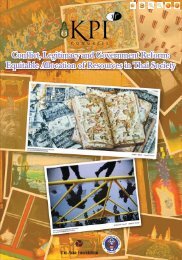SUFFiciENcy EcONOMy ANd GRASSROOtS DEvElOPMENt
SUFFiciENcy EcONOMy ANd GRASSROOtS DEvElOPMENt
SUFFiciENcy EcONOMy ANd GRASSROOtS DEvElOPMENt
Create successful ePaper yourself
Turn your PDF publications into a flip-book with our unique Google optimized e-Paper software.
The Meaning of Sufficiency Economy <br />
International Conference<br />
227<br />
In order to have such lives, villagers also recognize that they are dependent on<br />
the government for certain essential services. Without government investment<br />
villagers would not be able to travel easily on good roads or have electricity. They<br />
look to the government to support medical facilities. They also look to government<br />
to provide increasingly better education which they understand is fundamental to<br />
finding better jobs outside the agricultural sector.<br />
Villagers in Ban Nông Tün in recent elections, like villagers throughout most<br />
of the Northeast, were strongly supportive of the Thai Rak Thai Party because they<br />
received increased support in government services during the period when the<br />
government was controlled by Thai Rak Thai. This support included the expanded<br />
health care program through the 30-baht scheme and subsidies for students pursuing<br />
education in better schools outside their local community. Several villagers in Ban <br />
Nông Tün have created what is essentially an ambulance service to take sick vill<br />
agers to the hospital in Mahasarakham and all villagers avail themselves on a regular<br />
basis of services provided by the government at the Mahasarakham hospital and the<br />
tambon clinic in nearby Ban Khwao. More students from Ban Nông Tün today go <br />
to schools in Mahasarakham town than go to the local village school. <br />
Villagers have also come to take for granted the services – such as garbage<br />
collection – provided by the Tambon Administrative Organization, a local<br />
government body which gained more powers and budget under Thai Rak Thai<br />
governments. One of the government services villagers came most to appreciate<br />
during the Thai Rak Thai period was the expanded loan program. The village million<br />
baht fund made it possible for many villagers to gain access to capital needed for<br />
investing in traveling abroad for work or for local enterprises. Villagers are<br />
concerned about the increasing debt they have, but so long as interest rates are low<br />
and they are able to make sufficient money to pay back what they borrow, they see<br />
loans in positive terms.<br />
In short, while much of the economic development experienced by people<br />
from the village over the past forty years has come about as a consequence of their<br />
own imitative, they have also come to depend on essential government services to<br />
make it possible for them to emulate the lifestyles of urban middle class people.<br />
Most do not, however, seek to do so by moving from the village permanently to live<br />
in urban areas. The reason lies in the fact that the village is not only a place of<br />
residence; it is also a moral world.<br />
On the basis of research over forty years in the same village in northeastern<br />
Thailand, I have found that villagers have unequivocally chosen three courses of<br />
action which Yoshihara Kunio (1995), in a comparison of the Thai and Korean<br />
economies, argued are basic to significant economic growth, that is, to capitalistic<br />
development. Villagers have chosen to work long hours both in the village and for<br />
long periods of time away from the village. They have shown themselves very<br />
willing to take significant risks, especially in choosing to migrate for work not only<br />
to other places in Thailand, but also abroad, especially to Taiwan. They have also














